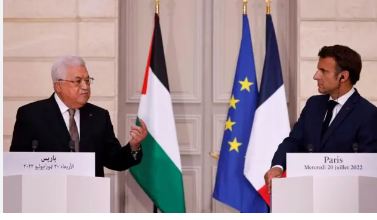In a landmark and historic announcement, French President Emmanuel Macron has declared that France will officially recognize the State of Palestine. This courageous and morally sound decision is already reverberating across Europe and the broader international community. France, a leading voice in global diplomacy and a key member of the European Union and the United Nations Security Council, has taken a stance that aligns with justice, peace, and the long-overdue rights of the Palestinian people.
This recognition is not merely symbolic; it carries immense political and diplomatic weight. For decades, the Palestinian people have been denied their rightful status as a sovereign nation, subjected to occupation, displacement, and dehumanizing embargoes. Macron’s move signals a decisive shift in European thinking — one that could catalyze a domino effect among other European nations who, until now, have remained hesitant under American and Israeli pressure.
France’s recognition comes at a time when the Israeli-Palestinian conflict has reached new levels of tragedy. In the wake of Hamas’ attack on Israel, which many Palestinians themselves have criticized as reckless and damaging to the broader cause, Israel launched a brutal military campaign that has left thousands of innocent Palestinian civilians dead. The world has witnessed horrifying images of children buried under rubble, elderly people fleeing bombed homes, and entire neighborhoods wiped out. These actions have been condemned as war crimes by human rights organizations across the globe.
Yet, for too long, the narrative has been monopolized by a simplistic binary: Israel’s right to defend itself versus Palestinian “terrorism.” Macron’s announcement disrupts this narrative. It sends a clear message that the international community must not confuse the actions of extremist factions like Hamas with the aspirations of the Palestinian people at large — a people who yearn for peace, dignity, and self-determination.
President Macron also made it clear that France’s recognition of Palestine is not a blank check for extremism. In his statement, he explicitly called for the disbandment of Hamas and all other radical wings that perpetuate violence. This is a legitimate and necessary demand. Extremist elements have indeed harmed the Palestinian cause, offering Israel justification for disproportionate retaliation. However, this does not mean the collective punishment of over two million people in Gaza is justifiable. The principle of proportionality in warfare has been entirely ignored by Israel, and Macron’s recognition of Palestine should also be viewed as a condemnation of such barbarity.
The French president is being widely hailed across the Global South and among progressive forces in Europe for this brave decision. Political analysts have termed it a step in the right direction — one that will encourage other EU states, especially those with growing domestic pressure to support Palestine, to follow suit. Spain, Ireland, Belgium, and some Scandinavian countries have already shown a favorable tilt. France’s move may push them off the fence.
At the same time, as expected, the United States and Israel have expressed displeasure. Washington, in particular, has long acted as a shield for Israeli policies at the United Nations, vetoing resolutions, and providing uncritical military and financial support. For decades, the U.S. has dictated the Middle East peace process, sidelining genuine efforts for justice in favor of maintaining its strategic alliances. Macron’s move challenges this status quo. It suggests that Europe, or at least France, is ready to chart its own course — one that prioritizes international law and human rights over geopolitical convenience.
Palestine’s recognition should also be accompanied by practical steps. Embargoes and blockades that have crippled the Palestinian economy and turned Gaza into an open-air prison must be lifted. The Palestinian people must be allowed to trade freely, travel without restrictions, and rebuild their war-ravaged cities with international support. Recognition should pave the way for embassies, diplomatic missions, and integration into global institutions — not just empty statements of solidarity.
Furthermore, France’s recognition must be backed by legal and political measures to hold Israel accountable for its actions. The killing of innocent civilians — including children and the elderly — cannot go unpunished. International courts and human rights tribunals must be activated. The world must send a message that no state, however powerful, is above international law.
It is also important to emphasize that Macron’s initiative reflects the voices of many Palestinians themselves — voices that are often drowned out by the noise of war and propaganda. Many Palestinians have openly criticized Hamas for its October 7 attack on Israel, recognizing it as a provocation that has brought unbearable suffering upon the broader population. They argue that they did not choose this path, and they should not be punished for decisions made by a militant faction. In this context, the international community has a moral responsibility to differentiate between legitimate political representation and violent extremism.
France’s move may also help reenergize the Middle East peace process — long dormant and largely co-opted by those with no genuine interest in peace. With France now recognizing Palestine, the two-state solution — though frail and battered — may once again gain traction. Macron’s message is simple yet profound: peace cannot be achieved through perpetual occupation, siege, and violence. It must begin with mutual recognition and respect.
The recognition of Palestine is not just a political statement; it is a moral one. It recognizes the humanity of a people who have been dehumanized for far too long. It acknowledges their right to live in freedom, security, and dignity. And it gives hope — however fragile — that justice can prevail.
France has made history. The world must not let this moment pass in vain. The time has come for other nations to join in this cause, to rise above political expediency, and to stand for what is right. The recognition of Palestine is not the end of the road; it is the beginning of a new path — one that could finally lead to peace, justice, and coexistence.
In conclusion, President Macron deserves praise for a bold, principled, and potentially game-changing decision. While criticism from powerful quarters was expected, history will remember this as a turning point. France has done what many nations have long feared to do — to speak the truth, to recognize the oppressed, and to push the world closer to justice. Now it is up to others to follow suit.

















